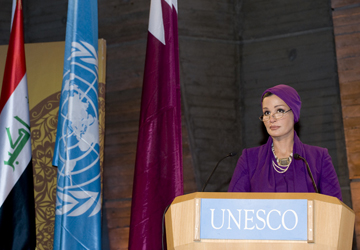| Middle East |
| H.H Sheikha Mozah addresses a UNESCO Conference in Paris |
 |
UNESCO Director-General Koichiro Matsuura praised H.H. Sheikha Mozah bint Nasser al Missned, UNESCO Special Envoy for Basic and Higher Education as a committed advocate for the right to education, especially in situations affected countries early last month, full text is follow: H.H. Sheikha Mozah bint Nasser al Missned, UNSECO Special Envoy for Basic and Higher Education delivered a speech at the Closing Session of the International Conference on the Right to Education in Crisis-Affected Countries early last month, full text is follow: In the name of Allah, Most Gracious and Most Merciful Mr. Secretary-General, Mr. Director-General, Ladies and Gentlemen: It is a pleasure for me on this occasion to convey my deepest thanks and profound appreciation for your fruitful efforts. I would like to congratulate everyone on the spirit of responsibility and seriousness that prevailed at this meeting. What are our subsequent steps? I think this legitimate query tempts many of those who are interested in our discussion, both inside and outside UNESCO. Many of us find ourselves disheartened as well as frustrated as we observe the discrepancies inherent in the challenge before us. On the one hand, we have the ideals and values approved by the international community and the international decisions and legislations. On the other hand, we have the bitter facts that prove daily how difficult it is to reach our goals, at least in the short term, due to the deficiency of resources and to the obstacles imposed by crises and war. I will not reiterate here what I discussed almost a month ago in However, I will take this opportunity to reaffirm that, in terms of providing education for all, we have no other alternative except to contain and enclose the sources of crises and war that threaten the components of educational systems, whether in human terms or otherwise. Our strategic goal does not stop at the point of material support - rather it surpasses to what is more important. As proof of this, let me bring your attention to a specific case. In January 2007, the initiative of "solidarity with Iraqi academics" was launched in The deductive lesson of that grief is this: due to the circumstances and current conditions surrounding the academic and educational environment, degradations in priorities have resulted in the natural conclusion that saving life must precede developing professional sufficiency and abilities. Indeed, in crises affected areas, we will find examples and similar cases that are significant to the rest of the educational system, such as the decline in education among schoolgirls in So how can we talk about the principles of generalization and reform of education when the basic right to education does not yet exist? An even more dangerous fact is that crises and war can create depressed and desperate youth, who then sometimes find themselves on dark streets rather than in classrooms. This segment in particular must become our target for school enrollment. War and crisis, because they destroy educational systems, are a primary source of terrorism. Therefore any foreseen progress in this path depends on removing the impeding causes that substantially lie in war and conflict. Crises and anxieties not only represent a momentous threat to the right of education, but they undermine our efforts to develop and improve the educational systems as well. Consequently, I think you will agree with me that we must not stop at just diagnosing or describing the case but rather step forward - it is fundamental that we approve an operational approach. From my view, this approach depends on two fundamentals. The first takes up a long term strategy to form a communal memory that challenges the limits. Its purpose is the edification of the juvenile to instill the ideals and values of the principles of human rights that are violated by wars and crises. This memory must authenticate all the violations that impact educational systems, especially the victimization of students, teachers and academics. Their remembrance must help prevent the repetition of these tragedies and repair the damage. As Mahatma Gandhi said: "Be the change you want to see in the world." We have to begin with the children. This is our shared responsibility, especially UNESCO. In your name I ask Director-General Matsuura, who clearly realizes how dangerous this situation is, to work to find the best ways to make this message reach all those who seek knowledge through courses or other communication media. The second joint is about translating and activating the output of this meeting. In regard to this, I call for a team to be established in the wake of this conference to summarize all the concerns and discussions raised by official authorities, international organizations, civil society, legal and human rights organizations, and donors. A detailed concept paper should then be prepared that crystallizes the conference recommendations into a blueprint that outlines all the provisional steps we must take to protect conflict-affected educational systems, with all their different components. For weeks, all of us have been noticing the alertness of the international community to economic collapse around the world. I think that protecting educational systems during crises also requires the attention and support of the international community. Thank you for your listening. I wish success and confirmation for our work here at this meeting. |
- Sultanate of Oman celebrates its 38th National Day
- Kuwait’s Amir Sheikh Sabah warned against undermining national unity
- President Sleiman’s visit to King Abdallah reaffirming Riyadh’s support for the process of conciliation in Lebanon
- Development march under Sheikh Khalifa the UAE President
- Prince Alwaleed a man for all titles
- Lebanese President hails Kuwait's support to his country
- Al Attiyah addressed a seminar on Dialogue in Spain
- Thousands of Christians flee violence in Iraq
- UN meet opens new era of peace
- Prince Turki accuses US government of doublespeak



















